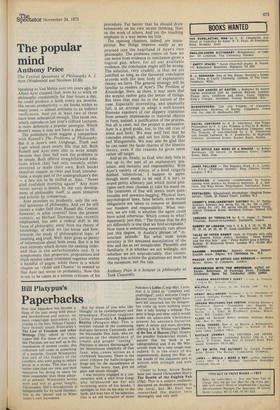Bill Platypus's
Paperbacks
Now that hippydom has become a thing of the past along with peace and brotherhood and justice, its more respectable antecedents are coming to the fore. Pelican Classics have recently issued Winstanley's The Law of Freedom and other Writings (75p). edited by Christopher Hill. For those of you who, like Platypus, are not well up in the manifestoes of ancient cranks, this collection will come as something of a surprise. Gerald Winstanley was one of the leaders of the Levellers, who were going to reduce prices at a stroke. This was at an earlier time than our own, and their measures for doing so seem far more reasonable than those adopted at present. Winstanley writes well and not at great length; Christopher Hill's introduction is indispensable for its lucid introduction to the 'period' and to Winstanley's own movement. But for those of you who like 'thought' to be contemporary and immediate. Platypus suggests Carlos Castaneda's A Separate Reality (Penguin 40p). This is another volume in the continuing dialogue between Castaneda and the inscrutable Don Juan, who expatiates on the importance of simple and proper "seeing". .Playypus is always discouraged by the meretricious simplicity of Don Juan, who comes across as a clockwork Socrates. There is the usual concern for hallucinogenic drugs and for the encumbrance of 'reason'. Too heavy, man, give me plain and simple thought.
I was recently engaged in a conversation with a man from Corgi, who belaboured me for not reviewing more of his books. I apologise to him on his way to the bank, and note two of his selection. One is an old favourite of mine:
Nabokov's Lolita (Corgi 40p). I note that it is titled as "complete and unabridged", and I welcome Corgi's discreet cover. No stone might have been left unturned, but the designer has come up with nothing more than a lady licking a lollipop. The print is large and clear, and it would make an admirable Christmas present for anyone's favourite niece. A newer and more shocking. offering is R. H. Whitecross's slaves of the Son of Heaven (35p). Despite the possible Nabokovian ironies, I assume that the book is autobiographical and, if so, Mr Whitecross must be a very tough man indeed. it is the story of his imprisonment, during the War, at the hands of the Japanese and is written with strength and with colour.
Closer to home, Arrow Books have just issued Christopher Hutt's The Dealth of the English Pub (75p). This is a subject endlessly discussed on drunken evenings in the local, but Mr Hutt has researched the matter very thoroughly and very well.


































 Previous page
Previous page